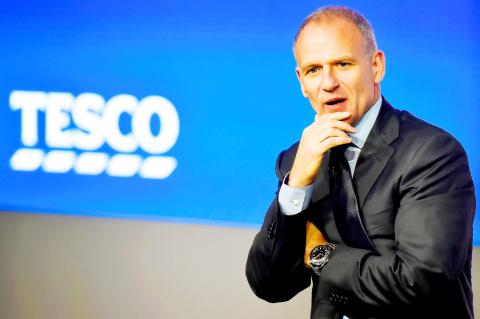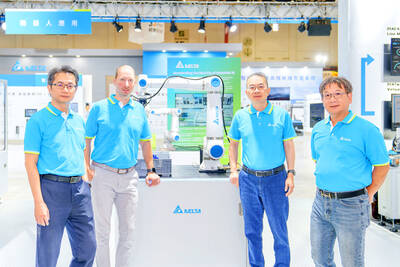Britain’s biggest supermarket chain, Tesco PLC, is considering the sale of its operations in Thailand and Malaysia as it refocuses on its domestic business amid mounting challenges in the core UK market.
The company is carrying out a strategic review of the businesses after receiving what it called inbound interest, it said in a statement on Sunday.
The deal could value the operations at as much as US$9 billion, Dow Jones reported earlier, citing people familiar with the plan.

Photo: Reuters
Tesco spokesman Simon Rew declined to comment on the valuation.
“The evaluation of strategic options is at an early stage, no decisions concerning the future of Tesco Thailand or Malaysia have been taken,” the statement said, adding that the process could end without a transaction being concluded.
While a sale would mean losing the fastest-growing part of its operations, Tesco would receive an infusion of cash to continue the restructuring of its core UK operations that has seen thousands of job cuts and a shift to new formats such as checkout-free stores.
It would also allow the British retailer to exit from a competitive Asian region that has already stymied the likes of European peers such as Carrefour SA.
Tesco Thailand is the biggest hypermarket chain in the country with 1,967 stores, while the Malaysian business has 74 stores.
The Thai business alone could be valued at nearly US$7 billion, because it includes real-estate assets, Dow Jones reported.
In the first half of fiscal year 2020, the retailer’s entire Asia business produced £2.6 billion (US$3.4 billion) of revenue, accounting for about 8 percent of total sales.
While still dominant in Thailand, Tesco is grappling with challenges such as chronically weak consumption trends, an increasingly stringent regulatory environment, and “formidable, well-connected competition,” said Maria Lapiz, head of research at Maybank Kim Eng Securities (Thailand) Pcl.
“There is no longer term growth here, and Tesco may want to rationalize its business and raise funding in the process as well,” she said.
Under outgoing chief executive officer Dave Lewis, Tesco streamlined its domestic operations with mass job cuts, and pulled back from some international markets.
Ken Murphy, who is to replace Lewis, will have to wrestle with a growing UK retail crisis exacerbated by Brexit, the shift to online shopping and competition from discounters Lidl Stiftung & Co and Aldi.
Tesco is likely to see acquisition interest from regional conglomerates that have been successful in combining local operation know-how with the cache of international brands. In Malaysia, Japanese retail giant Aeon Co acquired Carrefour’s operations in 2012 for US$276 million.
Thai conglomerates such as Central Group and the Singha Corp are potential buyers that could be drawn to Tesco’s large retail network in the country, Lapiz said.

SETBACK: Apple’s India iPhone push has been disrupted after Foxconn recalled hundreds of Chinese engineers, amid Beijing’s attempts to curb tech transfers Apple Inc assembly partner Hon Hai Precision Industry Co (鴻海精密), also known internationally as Foxconn Technology Group (富士康科技集團), has recalled about 300 Chinese engineers from a factory in India, the latest setback for the iPhone maker’s push to rapidly expand in the country. The extraction of Chinese workers from the factory of Yuzhan Technology (India) Private Ltd, a Hon Hai component unit, in southern Tamil Nadu state, is the second such move in a few months. The company has started flying in Taiwanese engineers to replace staff leaving, people familiar with the matter said, asking not to be named, as the

The prices of gasoline and diesel at domestic fuel stations are to rise NT$0.1 and NT$0.4 per liter this week respectively, after international crude oil prices rose last week, CPC Corp, Taiwan (台灣中油) and Formosa Petrochemical Corp (台塑石化) announced yesterday. Effective today, gasoline prices at CPC and Formosa stations are to rise to NT$27.3, NT$28.8 and NT$30.8 per liter for 92, 95 and 98-octane unleaded gasoline respectively, the companies said in separate statements. The price of premium diesel is to rise to NT$26.2 per liter at CPC stations and NT$26 at Formosa pumps, they said. The announcements came after international crude oil prices

STABLE DEMAND: Delta supplies US clients in the aerospace, defense and machinery segments, and expects second-half sales to be similar to the first half Delta Electronics Inc (台達電) expects its US automation business to remain steady in the second half, with no signs of weakening client demand. With demand from US clients remaining solid, its performance in the second half is expected to be similar to that of the first half, Andy Liu (劉佳容), general manager of the company’s industrial automation business group, said on the sidelines of the Taiwan Automation Intelligence and Robot Show in Taipei on Wednesday. The company earlier reported that revenue from its automation business grew 7 percent year-on-year to NT$27.22 billion (US$889.98 million) in the first half, accounting for 11 percent

A German company is putting used electric vehicle batteries to new use by stacking them into fridge-size units that homes and businesses can use to store their excess solar and wind energy. This week, the company Voltfang — which means “catching volts” — opened its first industrial site in Aachen, Germany, near the Belgian and Dutch borders. With about 100 staff, Voltfang says it is the biggest facility of its kind in Europe in the budding sector of refurbishing lithium-ion batteries. Its CEO David Oudsandji hopes it would help Europe’s biggest economy ween itself off fossil fuels and increasingly rely on climate-friendly renewables. While